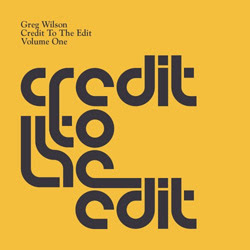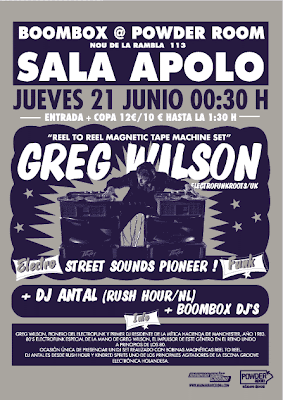 Many people who listen to electro today might not know that the roots of electro go all the way back to the early 80s, when it blasted the urban music scene alongside the growing hip-hop movement associated with legends such as DJ Kool Herc and Grandmaster Flash. The pioneer of US Electro Funk was the Bronx-based Afrika Bambaataa, who is also considered foundational to the beginnings of hip-hop. The defining record of the new genre was Bambaataa and The Soul Sonic Force’s Electro classic, “Planet Rock” (Tommy Boy, ‘82), which combined elements of Kraftwerk’s cyber electronic sounds, spacey funk grooves, rapping, and drum-machine generated syncopated rhythms. Electro funk's vast legacy in shaping hip-hop and electronic music in the US and overseas is undeniable. (Photo: Greg Wilson Melting Pot / Glasgow - 2004)
Many people who listen to electro today might not know that the roots of electro go all the way back to the early 80s, when it blasted the urban music scene alongside the growing hip-hop movement associated with legends such as DJ Kool Herc and Grandmaster Flash. The pioneer of US Electro Funk was the Bronx-based Afrika Bambaataa, who is also considered foundational to the beginnings of hip-hop. The defining record of the new genre was Bambaataa and The Soul Sonic Force’s Electro classic, “Planet Rock” (Tommy Boy, ‘82), which combined elements of Kraftwerk’s cyber electronic sounds, spacey funk grooves, rapping, and drum-machine generated syncopated rhythms. Electro funk's vast legacy in shaping hip-hop and electronic music in the US and overseas is undeniable. (Photo: Greg Wilson Melting Pot / Glasgow - 2004)In the UK, Electro Funk played a similarly key role in influencing electronic music genres such as house, jungle, trip-hop, drum & bass, UK Garage, and subsequent hip-hop.
 It also, according to UK Electro funk legend Greg Wilson, provided a bridge between the British Jazz-Funk underground and acid-house. The heydays of British Electro go back to ’83, when Morgan Khan launched the “Street Sounds Electro” series, introducing the new genre to UK audience. Call it a scam or simply brilliant marketing tactics, Khan decided to give the illusion of a blossoming Electro scene by asking the three major players, Greg Wilson (by this time had an almost decade long experience as a DJ), Martin Jackson (ex-Magazine) and Andy Connell (Factory band, A Certain Ratio) to come up with aliases on the new record "UK Electro" thus giving the idea of more extensive Electro movement (e.g. Broken Glass, Zer-o, Forevereaction, and Syncbeat). Adding to the hype, the Face announced “Electro – The Beat That Won’t Be Beaten” on his cover in June ‘84, just before the release of “UK Electro.” Early 80s Electro Funk was responsible for bringing hip-hop and b-boying to the UK music scene, and, as Electro Funk guru Greg Wilson put it, it provided a catalyst for social change, much like the punk movement of the late 70s and early 80s.
It also, according to UK Electro funk legend Greg Wilson, provided a bridge between the British Jazz-Funk underground and acid-house. The heydays of British Electro go back to ’83, when Morgan Khan launched the “Street Sounds Electro” series, introducing the new genre to UK audience. Call it a scam or simply brilliant marketing tactics, Khan decided to give the illusion of a blossoming Electro scene by asking the three major players, Greg Wilson (by this time had an almost decade long experience as a DJ), Martin Jackson (ex-Magazine) and Andy Connell (Factory band, A Certain Ratio) to come up with aliases on the new record "UK Electro" thus giving the idea of more extensive Electro movement (e.g. Broken Glass, Zer-o, Forevereaction, and Syncbeat). Adding to the hype, the Face announced “Electro – The Beat That Won’t Be Beaten” on his cover in June ‘84, just before the release of “UK Electro.” Early 80s Electro Funk was responsible for bringing hip-hop and b-boying to the UK music scene, and, as Electro Funk guru Greg Wilson put it, it provided a catalyst for social change, much like the punk movement of the late 70s and early 80s. Greg Wilson is the man you should know when it comes to UK Elektro funk. Often referred to as the "Godfather of UK Electro Funk", “disco-chemist”, “Electro grandmaster”, “master of re-edits”, Greg is undeniably a true genius in his field. A dance music perfectionist at heart, he was foundational to the short-lived UK Electro scene, which nonetheless had an enormous impact on later genres. His re-edits of old soul, funk, disco, and new wave tracks merge into seamless mixes…mixes with a stainless flow so beautifully pleasurable, that the experience instantly justifies the accuracy of the slogan- ELECTRO IS AURAL SEX- on the UK ELEKTRO record (Street Sounds Electro). Personally, I prefer Greg's trademark Electro funk to its overseas brother, as it is much closer to disco than its US counterpart. (To get a feel for his music, check for mp3 links here.)
Greg Wilson is the man you should know when it comes to UK Elektro funk. Often referred to as the "Godfather of UK Electro Funk", “disco-chemist”, “Electro grandmaster”, “master of re-edits”, Greg is undeniably a true genius in his field. A dance music perfectionist at heart, he was foundational to the short-lived UK Electro scene, which nonetheless had an enormous impact on later genres. His re-edits of old soul, funk, disco, and new wave tracks merge into seamless mixes…mixes with a stainless flow so beautifully pleasurable, that the experience instantly justifies the accuracy of the slogan- ELECTRO IS AURAL SEX- on the UK ELEKTRO record (Street Sounds Electro). Personally, I prefer Greg's trademark Electro funk to its overseas brother, as it is much closer to disco than its US counterpart. (To get a feel for his music, check for mp3 links here.)When he retired from DJing in ’83, he has had behind him an eight-year DJing experience playing soul, funk, disco, and electro, establishing a cult following in Manchester’s underground nightclub scene at Wigan Pier, Legends, and The Haçienda, and he had been the manager of UK’s best known b-boy crew, Manchester’s Broken Glass. (photo: Greg Wilson spinning at Legend.)

In his own words, “Electro-Funk is undoubtedly the most misunderstood of all UK Dance genres, yet probably the most vital with regards to its overall influence. Central to the confusion is the term itself, which during 82/83 (before it was shortened to Electro) was specific to the UK. From a US perspective this music would come under a variety of headings (including Hip-Hop, Dance, Disco, Electric Boogie and Freestyle), arriving on import here in the UK mainly on New York labels like West End, Prelude, Sugarhill, Emergency, Profile, Tommy Boy, Streetwise, plus numerous others. Just as Northern Soul was a British term for a style (or group of styles) of American black music, so was Electro-Funk, and, like Northern, the roots of the scene are planted firmly in the North-West of England […] As has often been said, Electro is the missing link of Dance music. All roads lead back to New York where the level of musical innovation and experimentation throughout the early 80s period was quite staggering. It wasn’t one narrow style that never strayed from within the confides of an even narrower BPM range, Electro-Funk was anything goes! The diversity of records released during this period was what made it so magical, you never knew what was coming next. The tempo of these tracks ranged from under 100bpm to over 130, covering an entire rhythmic spectrum along the way. There was no set template for this new Dance direction, it just went wherever it went and took you grooving along with it. It was all about stretching the boundaries that had begun to stifle black music, and its influences lay not only with German Technopop wizards Kraftwerk, the acknowledged forefathers of pure Electro, plus British Futurist acts like the Human League and Gary Numan, but also with a number of pioneering black musicians. Major artists like Miles Davis, Sly Stone, Herbie Hancock, Stevie Wonder, legendary producer Norman Whitfield and, of course, George Clinton and his P Funk brigade, would all play their part in shaping this new sound via their innovative use of electronic instruments during the 70s (and as early as the late 60s in Miles Davis’ case). Once the next generation of black musicians finally got their hands on the available technology it was bound to lead to a musical revolution as they ripped up the rule book with their twisted Funk (read more here)."

 Well, lucky for us, Greg has returned to producing music and deejaying from his retirement, and, not surprisingly, he came out with a banging new album, “Credit To The Edit” (read about reactions to the album here) . Volume 2 of “Credit To The Edit” is scheduled to come out in 2008, so make sure to check back in with him.
Well, lucky for us, Greg has returned to producing music and deejaying from his retirement, and, not surprisingly, he came out with a banging new album, “Credit To The Edit” (read about reactions to the album here) . Volume 2 of “Credit To The Edit” is scheduled to come out in 2008, so make sure to check back in with him.Also, Greg is touring the UK as part of Rizla Invisible Players along with Pete Fowler, Don Letts, and Andy Votel.
LINKS TO
his myspace
his website (a treasure trove of mp3 links, articles about UK Electro, and other earcandies)
0 comments:
Post a Comment